Q&A w/ Author, GEORGE PACKER – THE UNWINDING: Inner History of New America
Written on February 5th, 2015Aired: 06/09/13
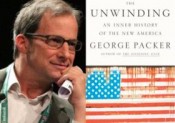 |
NYTimes review: “This book hums – with sorrow, outrage and compassion.”- #8 Best-seller
Q&A: LESTER BROWN – FULL PLANET, EMPTY PLATES
Written on December 25th, 2014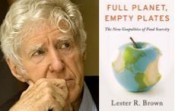 |
Aired: 12/23/12
Recorded: 10/17/12
When gas prices were at or near record highs a few months ago in the US, that got people’s attention. What about food prices? Have you noticed them rising? Are you making different choices in the supermarket? If not, it might be because of two things.
One, in America so much of our food is processed, packaged and marketed, that raw commodity prices make up only a fraction of the price of the food we buy. In other countries, especially the less developed ones, an increase in the price of rice or corn can have a major effect on how much a family can afford to eat. Two, Americans spend only 9% percent of their income on food, while millions around the world spend 50-70%. Millions of households now routinely schedule foodless days each week-days when they will not eat at all. A recent survey by Save the Children shows that 14% of families in Peru now have foodless days. India, 24%. Nigeria, 27%.
In his newest book, FULL PLANET, EMPTY PLATES, LESTER BROWN writes,
“The U.S. Great Drought of 2012 has raised corn prices to the highest level in history. The world price of food, which has already doubled over the last decade, is slated to climb higher, ushering in a new wave of food unrest. This year’s corn crop shortfall will accelerate the transition from the era of abundance and surpluses to an era of chronic scarcity. As food prices climb, the worldwide competition for control of land and water is intensifying. In this new world, access to food is replacing access to oil as an overriding concern of governments. Food is the new oil, land is the new gold. Welcome to the new geopolitics of food.”
www.earth-policy.org
Free Forum Q&A : JANE McGONIGAL, REALITY IS BROKEN – How Gamers Can Change the World
Written on October 17th, 2014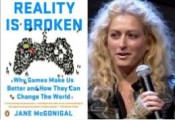 |
In her There are 183 million active video gamers in the US, and the average young person will spend 10,000 hours gaming by the age of 21. There are now more than five million “extreme” gamers” in the US who play an average of 45 hours a week.
According to game designer JANE McGONIGAL, this is because videogames are increasingly fulfilling genuine human needs. But she goes way beyond that, in her first book, REALITY IS BROKEN– just out in paperback – she suggests we can use the lessons of game design to fix what is wrong with the real world.
Drawing on positive psychology, cognitive science, and sociology, she shows how game designers have hit on core truths about what makes us happy so that videogames consistently provide the exhilarating rewards, stimulating challenges, and epic victories that are so often lacking in the real world.
I recommend REALITY IS BROKEN to people who have no interest in games. Separate from what it says about the current reality and possible future of games, the book is an excellent primer on what we have learned – and most people don’t know – about happiness, learning, productivity and growth.
Q&A: DAVID KIRP, Author – Kids First
Written on October 8th, 2014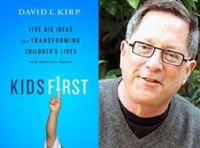 |
Q&A: Frances Moore Lappé, Author – ECOMIND: CHANGING THE WAY WE THINK, TO CREATE THE WORLD WE WANT
Written on October 2nd, 2014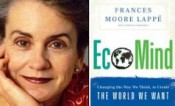 |
Aired: 9/8/13
Originally Aired: 12/30/12
Where do you think the most important changes need to take place to turn things around in terms of big issues like the economy, the environment, and social justice?
Some might say climate change is the critical global issue so it must be clean energy. Others might say nothing will make as much difference for the world’s people as educating and empowering girls and women. Closer to home, a case can be made that public financing of political campaigns would have the most impact on all such issues by making it possible for the power of the United States to become a greater force for good.
All good answers, but this week’s guest gives another answer – and its one that I share. Frances Moore Lappe, who has herself been a force for good at least since the publication of the phenomenal best-seller Diet for a Small Planet in 1971, says that the greatest impact would follow from changing our minds.
In her 18th book, ECOMIND: CHANGING THE WAY WE THINK, TO CREATE THE WORLD WE WANT, Lappé argues that much of what is wrong with the world, from eroding soil to eroding democracies, results from ways of thinking that are out of sync with human nature and nature’s rhythms. Humans are doers, she says. But our capacity for doing is undermined by seven “thought traps” that leave us mired in fear, guilt, and despair — none of which are motivators to action.
Drawing on the latest research in climate studies, anthropology, and neuroscience, she weaves her analysis together with stories of real people the world over, who, having shifted some basic thought patterns, now shift the balance of power in our world. Chapter-by-chapter, Lappé takes us from “thought trap” to “thought leap,” and with each shift, challenges become opportunities.
